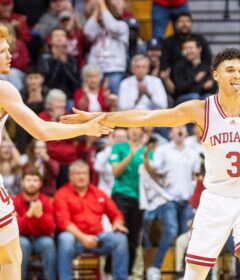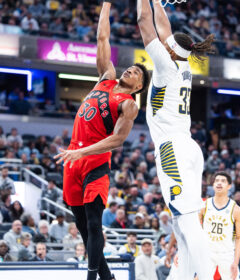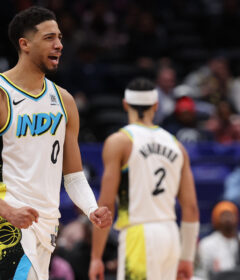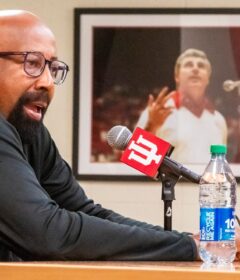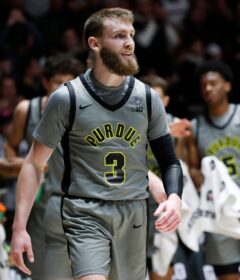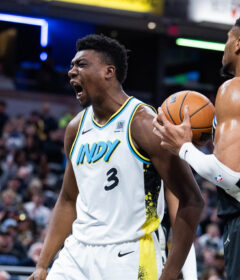Malone, not Duncan, best power forward ever
By CLIFF BRUNT
ISL Editor
As someone who isn’t as young as he used to be, I can’t help but enjoy watching Tim Duncan take folks back to Basketball 101 during the playoffs. He’s putting in work for the Spurs, and he might just get another NBA title out of it.
There’s just one problem. I’ve heard so much about him being the greatest power forward of all time that I finally am compelled to speak up.
Tim Duncan is NOT the greatest power forward of all time.
Karl Malone is the greatest power forward of all time.
Not only that, we probably won’t see one better than Malone anytime soon, unless LeBron James decides to play the position full time.
Big Jason back in Nebraska, I know you’re not going to like this, but hear me out. And before I go any further, I must say this blog is in no way influenced by the fact that my nickname at Fontenelle Park back in the old ˜hood was ˜Little Malone.’ Not at all, though I wore that title proudly.
Here’s why the train to Duncanville needs to stop, or at least slow down.
It’s easy to get caught up in the hype and the right now. It’s human nature. And it’s been a fun ride. Duncan, who was 35 when the season began, has found the fountain of youth. We respect him. We envy him. He’s a good guy in an era of villains, and we want him to do well.
For perspective, let’s talk about what Malone did for the Utah Jazz at 35.
He was the league MVP.
I kid you not. Receding hairline and all, Karl Malone averaged 23.8 points and 9.4 rebounds a game during a lockout-shortened campaign. He wasn’t just good for his age or a nice complement to the real, younger star of the team. He was the best player in the world.
It should be noted that Malone was also the league MVP in 1997, at age 33, when he averaged 27.4 points and 9.9 rebounds and shot 55 percent.
Malone is the No. 2 scorer in the history of the NBA. That’s ever, in case it wasn’t clear. He had a triple-double with the Lakers at age 40. He was an absolute freak of nature who looked like he should have been playing tight end in the NFL. He was skilled, a game-altering passer who developed a killer mid-range jumper to go with his freakish strength and ability to run the floor at 6-foot-9 and 260 pounds.
Don’t get me wrong, Duncan has been amazing. He’s a four-time NBA champion, a two-time league MVP and a three-time Finals MVP. He has been an amazing force both as an offensive and defensive player.
Side by side, here are the career numbers. Remember, the averages for Malone are affected by the fact that he played into his 40s.
Malone Duncan
PPG 25.0 20.3
RPG 10.1 11.3
FG pct. .516 .507
FT pct. .742 .688
APG 3.6 3.1
BPG 0.8 2.5
In most categories, Malone was better. Now, I agree with the argument that he played in a more wide-open era and that should be considered when reviewing his stats, but at the very least, these numbers suggest that Malone should be more than an afterthought.
There are a few other factors to consider.
Many often criticize Malone for not winning a title. He went against Chicago’s Michael Jordan twice in the NBA Finals and gave his Bulls as much trouble as any player during the Bulls’ run of six titles. Duncan never had to go through M.J. If he did, he might not have those rings or the Finals MVP awards.
Duncan always has been one of several top shelf options. He’s had Tony Parker and Manu Ginobili for most of his run, and he had David Robinson when he won his first title. Malone had the great point guard, John Stockton, but Stockton wasn’t a scorer. Everybody knew Utah was going to run that pick-and-roll. Everybody knew Malone was the man. Nobody had an answer. When the Jazz played Chicago in the 1998 Finals, Utah’s No. 2 scorer was Jeff Hornacek, who averaged 14.2 points per game. No offense, but Jeff Hornacek? Your call, Hornacek or Ginobili. It’s pretty clear that Malone had more responsibility and more production on offense with less talent around him.
Duncan is the superior defender, but the difference is not overly significant. Duncan has been on the All-Defense first team eight times; Malone made it three times, including during his MVP season at 35. Malone ranks 10th in league history in steals and first in defensive rebounds.
Again, Duncan is great. His grasp of fundamental skills is a lost art, and his conditioning and understanding of the game are legendary. But Malone had those things, too.
So, there’s my rant. Maybe I’m old school. Maybe I like history. Maybe I just get tired of commentators and others who should know better overlooking Malone. But there’s my argument. Take it or leave it.

